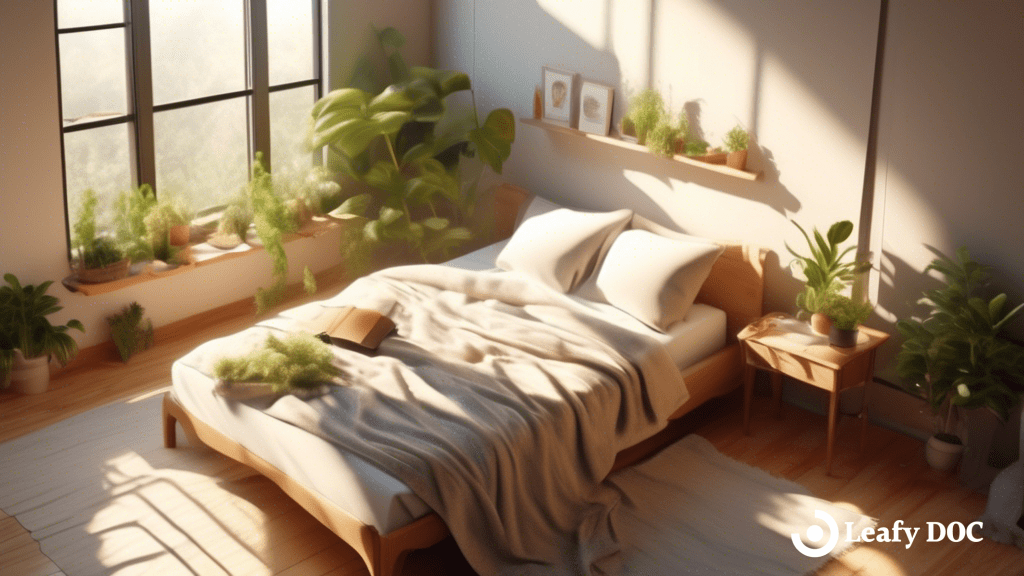Latest Research On Cannabis And Sleep Disorders: What You Need To Know
by Tayyaba Amir · February 24, 2024
Uncover the surprising link between cannabis and sleep disorders in the latest research. Find out what you need to know for a restful night’s sleep – click here now!

Are you struggling to get a good night’s sleep? If so, you’re not alone. Many people around the world suffer from sleep disorders that can leave them feeling tired, groggy, and irritable during the day. But did you know that cannabis could potentially help improve your sleep? The latest research on cannabis and sleep disorders has revealed some fascinating insights that you need to know.
In this article, we will explore the relationship between cannabis and sleep, the different types of sleep disorders, and the effects of cannabis on sleep quality. We will also discuss the potential benefits and risks of using cannabis to manage sleep disorders.
Whether you’re a long-time cannabis user or just curious about its potential benefits, this article will provide you with the latest research and recommendations for using cannabis to improve your sleep.
So, if you’re tired of tossing and turning at night, keep reading to discover how cannabis could be the answer to your sleep problems. Don’t let sleep disorders hold you back from living your best life – let the latest research on cannabis and sleep disorders guide you towards a restful and rejuvenating night’s sleep.
The Relationship Between Cannabis and Sleep
If you’re searching for the key to unlocking a restful night’s sleep, cannabis may just be the hidden treasure you’ve been seeking. Recent research has shown that cannabis can have a positive impact on sleep disorders, such as insomnia and sleep apnea.
By interacting with the body’s endocannabinoid system, cannabis can help regulate sleep patterns and promote more restful sleep. One of the main ways cannabis can improve sleep is by reducing anxiety and stress. Many people struggle to fall asleep because their minds are racing with worries and thoughts. Cannabis can help calm the mind and relax the body, making it easier to drift off into a peaceful slumber.
Additionally, cannabis has been found to have sedative effects, which can help individuals fall asleep faster and stay asleep throughout the night. But it’s not just about the physical benefits of cannabis on sleep. There is also a psychological aspect to consider. When you use cannabis to help with sleep, you are taking control of your own well-being and prioritizing your rest.
By choosing to use cannabis as a sleep aid, you are showing yourself that you value your sleep and are willing to do whatever it takes to get a good night’s rest. This act of self-care can have a positive impact on your overall mental health and sense of well-being. So if you’re tired of tossing and turning all night, consider giving cannabis a try. You may just find the restful night’s sleep you’ve been longing for.
Types of Sleep Disorders
Explore the various types of sleep disorders that can affect your restful nights and discover how cannabis may offer potential relief. When it comes to sleep disorders, there are a number of different conditions that can disrupt your ability to get a good night’s sleep.
Here are two sub-lists to help you understand the different types of sleep disorders and how they can impact your sleep:
Insomnia
- Difficulty falling asleep or staying asleep
- Waking up too early in the morning
Sleep apnea
- Interruptions in breathing during sleep
- Loud snoring and gasping for air
Restless legs syndrome
- Uncomfortable sensations in the legs
- Urge to move the legs, often worsening at night
Narcolepsy
- Excessive daytime sleepiness
- Sudden loss of muscle tone (cataplexy)
Parasomnias
- Sleepwalking
- Night terrors
Circadian rhythm disorders
- Jet lag
- Shift work sleep disorder
Effects of Cannabis on Sleep Quality
The use of cannabis can significantly impact the quality of your sleep. Research has shown that cannabis can have both positive and negative effects on sleep, depending on various factors such as the strain of cannabis, dosage, and individual differences.
One of the main ways cannabis can affect sleep is by reducing the time it takes to fall asleep. Many people who struggle with insomnia or difficulty falling asleep have reported that using cannabis helps them relax and drift off to sleep more quickly. This is due to the calming and sedative effects of certain cannabinoids found in cannabis, such as THC and CBD.
However, it’s important to note that while cannabis may help you fall asleep faster, it can also disrupt the quality of your sleep. Studies have shown that cannabis use can lead to a decrease in REM sleep, which is the stage of sleep associated with dreaming and memory consolidation. This means that even though you may be asleep for a longer period of time, the quality of your sleep may be compromised.
Additionally, regular cannabis use can lead to tolerance and dependence, which can further disrupt your sleep patterns. This means that over time, you may need to use higher doses of cannabis to achieve the same sleep-inducing effects, and if you try to stop using cannabis, you may experience withdrawal symptoms that can negatively impact your sleep.
Potential Benefits and Risks of Cannabis for Sleep Disorders
One potential benefit of cannabis for sleep disorders is its ability to promote relaxation and calmness, symbolizing a soothing refuge from the restlessness of insomnia. When you’re struggling to fall asleep or stay asleep, cannabis can help calm your mind and ease your anxieties, allowing you to drift off into a peaceful slumber.
Here are three potential benefits of using cannabis for sleep disorders:
-
Improved sleep quality: Cannabis has been found to increase total sleep time and reduce the number of times you wake up during the night. By promoting a deeper and more restful sleep, it can help you wake up feeling refreshed and rejuvenated.
- Reduced pain and discomfort: If your sleep disorder is accompanied by chronic pain or discomfort, cannabis can provide relief. It has been shown to have analgesic properties, helping to alleviate pain and making it easier for you to fall asleep and stay asleep.
- Decreased nightmares and vivid dreams: For those who suffer from nightmares or vivid dreams that disrupt their sleep, cannabis may offer relief. It can suppress REM sleep, the stage of sleep associated with dreaming, reducing the occurrence of disturbing dreams.
However, it’s important to note that while cannabis may offer potential benefits for sleep disorders, there are also risks to consider. It can have side effects such as drowsiness, impaired memory and concentration, and dependence. Additionally, the long-term effects of cannabis use for sleep disorders are still not fully understood, and more research is needed to determine its safety and effectiveness.
It’s always recommended to consult with a healthcare professional before using cannabis as a sleep aid, as they can provide personalized advice and guidance based on your specific needs and medical history.
Recommendations for Cannabis Use in Managing Sleep Disorders
Consider incorporating cannabis into your nightly routine to improve your sleep quality and manage any sleep-related issues you may be experiencing. Research has shown that cannabis can have a positive impact on sleep, particularly in individuals with sleep disorders such as insomnia.
The cannabinoids found in cannabis have been found to interact with the body’s endocannabinoid system, which plays a role in regulating sleep patterns. By using cannabis, you may be able to fall asleep more easily, stay asleep throughout the night, and wake up feeling refreshed and energized.
It’s important to note that while cannabis can be beneficial for sleep, it’s not a one-size-fits-all solution. The effects of cannabis can vary from person to person, and it’s important to find the right strain and dosage that works best for you.
It’s recommended to start with a low dosage and gradually increase as needed, under the guidance of a healthcare professional. Additionally, it’s crucial to practice responsible and safe cannabis use, as excessive use can lead to dependency and other negative effects on your health.
If you’re considering using cannabis for sleep disorders, it’s recommended to consult with a healthcare professional who can provide personalized recommendations and guidance based on your individual needs and circumstances. By incorporating cannabis into your nightly routine, you may find relief from sleep issues and improve your overall well-being.
Frequently Asked Questions
Can cannabis be used as a long-term solution for sleep disorders, or is it only effective in the short term?
Looking for a long-term solution for sleep disorders? Well, cannabis might just be your dream come true! While it’s effective in the short term, research suggests it could also be a snooze-inducing superhero in the long run.
Are there any specific strains of cannabis that are more effective for sleep disorders than others?
When it comes to strains of cannabis for sleep disorders, some individuals find that indica strains with higher levels of THC are more effective in promoting relaxation and aiding in sleep.
How does cannabis compare to other traditional sleep medications in terms of effectiveness and safety?
When it comes to comparing cannabis to traditional sleep medications, it’s important to consider both effectiveness and safety. While cannabis may be effective for some, traditional sleep medications have been studied more extensively and have established safety profiles.
Are there any potential negative side effects of using cannabis for sleep disorders that should be considered?
Potential negative side effects of using cannabis for sleep disorders include impaired memory, cognitive function, and coordination, as well as increased risk of addiction and withdrawal symptoms. It’s important to consult with a healthcare professional before using cannabis as a sleep aid.
Is it possible to become dependent on cannabis for sleep, and if so, how can this be managed or avoided?
Yes, it is possible to become dependent on cannabis for sleep. To avoid this, it’s important to use it responsibly and in moderation. Developing healthy sleep habits and exploring other remedies can also help manage dependence.
Last Updated: August 8, 2024
Get Approved for Your Medical Marijuana Card in Minutes!

Get Your Medical Card
Connect with a licensed physician online in minutes

Like This Article?
Share with your friends
Table of Contents
Keep Reading
-
Practicing Mindfulness With Cannabis For Stress Relief
Uncover the powerful synergy of cannabis and mindfulness for stress relief. Master techniques for a tranquil mind and inner peace in this insightful guide. Start practicing mindfulness with cannabis today!
-
4 Steps to Obtain Your Medical Marijuanas Card KY
Learn how to obtain your medical marijuanas card in KY with our simple four-step guide.
-
Managing Parkinson’s Disease With Medical Marijuana
Find out how medical marijuana is transforming the lives of Parkinson’s disease patients. Learn about the incredible benefits and relief it offers. Click here to discover a natural solution for managing Parkinson’s with cannabis today!



